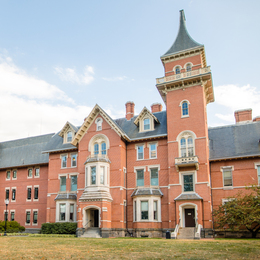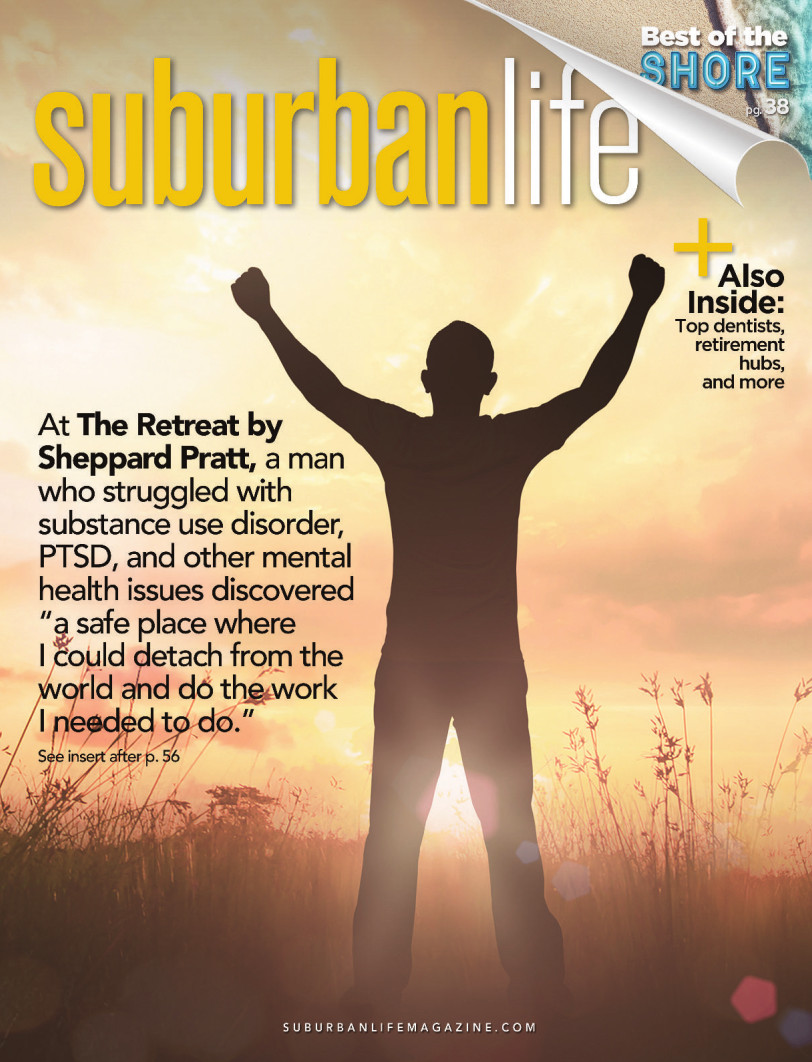
On Stable Ground
At The Retreat by Sheppard Pratt, a man who struggled with substance use disorder, PTSD, and other mental health issues discovered “a safe place where I could detach from the world and do the work I needed to do.”
Tom Miller* had what he describes as a “normal upbringing” while coming of age in Pittsburgh. He loved music and played drums in various jazz and rock bands. His ambition led him away from Pennsylvania—first to college in Boston, where he studied economics, and then to Chicago, where he began building his career in the business world.
Most people who met him considered him composed and hardworking, though his tendency to drink too much wine and hard alcohol—multiple bottles each day—often “got in the way.” He chose sobriety after 10 or more years as an active alcoholic, though he continued to struggle more than even his closest friends or family members would realize.
Then, in the summer of 2018, Miller began to resolve a painful secret from his childhood.
“I was sexually abused as a child,” he says. “I have PTSD as a result of that trauma. It took me until I was 35 years old to deal with it. I was happy to deal with it, but I got to a point where things felt very hopeless. I didn’t know how to deal with it. It felt like too much. I had been sober a year, maybe a year and a half, when I attempted suicide.”
After his attempt to take his own life, Miller spent a week in intensive care, followed by a stint in psychiatric care at a hospital in the Chicago area. Slowly, he began to see a path forward, brought about in part by a condition of his discharge from psychiatric care: He would need to enter a residential treatment program to help him address his unresolved trauma and other mental health issues that had been hurting him.
His doctors recommended The Retreat by Sheppard Pratt, located in Towson, Maryland, north of Baltimore. There, he would live among fellow residents seeking clinical and therapeutic treatment for substance use issues, mood disorders, and other problems pertaining to mental health. He promptly entered The Retreat, where his medical team diagnosed him with bipolar disorder, in addition to PTSD and alcoholism, and placed him on a co-occurring disorders track.
“It was a warm environment, and the staff was very welcoming,” he says. “It felt like a safe place where I could detach from the world and do the work I needed to do. I was open to whatever they thought was going on with me and whatever they thought would help me. I was desperate to get better at that point.”
Miller participated in various forms of therapy to help him heal and progress—art therapy, yoga and meditation, acupuncture, and Chinese medicine, among others—all of which he found particularly helpful. Likewise, time spent with his attending psychiatrist proved enlightening to say the least.
“She helped me figure out who I was, what I needed, and how to live a stable life,” he says of his psychiatrist. “She taught me how to deal with what happened to me. She put me back together. I had the gift of desperation working for me, and that made it less difficult for me to turn a corner.”
Miller also took a great deal from his sessions with Denise Connelly, LCSW-C, MAC, CAC-AD, ACRPS, an addiction therapist with The Retreat by Sheppard Pratt. As someone who once had her own struggles with substance use, Connelly strived to help Miller visualize a life in which he could remain sober.
“It’s a team effort,” says Connelly. “We have full staff meetings—psychiatrists, family therapists, addiction therapists, social workers, members of the wellness team—to answer one question about each patient: What does this person need? These are weekly meetings, sometimes more often, to make sure specific team members are on the same page. It’s a lot of manpower to make sure we’re meeting the patient where they are and providing what they need.”
Miller spent three to four months at The Retreat and Ruxton House, a transitional space not far from The Retreat where he could continue his individual and group therapy in an environment that would help him “slowly reintegrate into the real world.” Once he and his team felt confident in his progression, he left Ruxton House and returned to his life.
Miller led a life of stability after leaving Ruxton House—until his relapse in late 2020.
“I’m an alcoholic, and I had convinced myself that drinking wouldn’t be an issue for me,” he says. “That took on a whole new life. When I drink [alcohol], I get to a point where I’m drinking morning, afternoon, and evening. That made my medications ineffective, which led to a series of manic episodes. I crashed in January of this year. That’s when I called Denise at Sheppard Pratt and let her know what was going on.”
Miller and Connelly agreed that he should return to inpatient care, either at The Retreat or somewhere else. He ultimately chose to come back to The Retreat and resume his treatment with a team he felt he could trust.
“Throughout my career, you don’t always see the outcome of your work,” Connelly says. “For me, it’s about planting a seed of hope and providing a good experience with a therapist. When someone calls me, like Tom did, it’s a goal met, because he’s saying, ‘I messed up but am not afraid to admit it.’ Relapse is a part of the process for a lot of people, and when that happens they need someone they can look to for help.”
Connelly believes Miller’s relapse stems from the fact that he did not cultivate a post-treatment support network through a fellowship-based organization such as Alcoholics Anonymous.
“You have to be vigilant in recovery,” she says. “Some kind of self-help component is necessary. You need to have a support group every day—your tribe of people who understand the insidious nature of the disease of addiction, people who have done things and said things and experienced things that are very shameful, so you realize you’re not the only one. The disease doesn’t go away, but that kind of support helps you realize life can get better and things can change.
“I’d say Tom was abstinent, but abstinence does not equal recovery,” she continues. “For people like him who have co-occurring issues, you have to deal with all of those issues at the same time to be successful. If you just take medication for bipolar disorder but still drink, it’s not going to work. If you focus on your sobriety but don’t address the emotional pain, you’re not going to have a solid foundation. With Tom, he needed 12-step support—that was the medicine not being taken. This time, that’s what’s different about him. I feel good about his prognosis.”
As of press time, Miller had left Ruxton House to live on his own and restart his career. Having decided to build his life in the Baltimore area, he has become “plugged in” to a local AA chapter. In addition to attending AA meetings regularly, he has the support of his family, which recently bought a house in nearby Annapolis. He also expects to keep in touch with members of his care team at Sheppard Pratt, as well as fellow residents he met during both stays at The Retreat, who helped him realize he was not the only one struggling.
“People literally move their lives to the area so they can stay with their treatment team,” Connelly adds. “Even after working here for as long as I have, I’m still in awe when that happens. It says a lot about what people gain from their time and experience here.”
After so many years in turmoil, Miller feels as though he has gotten to a good place in his life—and he intends to stay there.
“I feel very stable, sober, and grateful for everything my family has done to help me, and everything Sheppard Pratt has done,” he says. “It’s an exceptional, extraordinary place. Anyone who needs their help and has the opportunity to go there is very fortunate.”
The Retreat by Sheppard Pratt
6501 N. Charles Street
Baltimore, MD 21204
(410) 938-5000
retreat.sheppardpratt.org
6501 N. Charles Street
Baltimore, MD 21204
(410) 938-5000
retreat.sheppardpratt.org
* Name changed to protect privacy
Photo by Nina Lea Photography
Published (and copyrighted) in Suburban Life magazine, June 2022.



